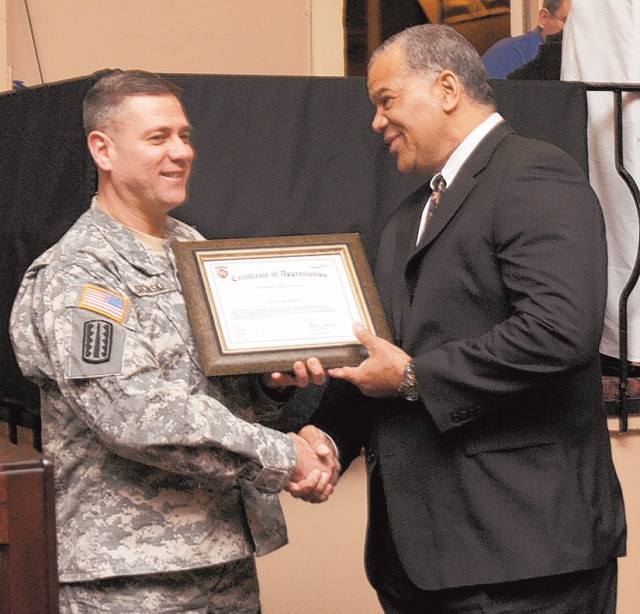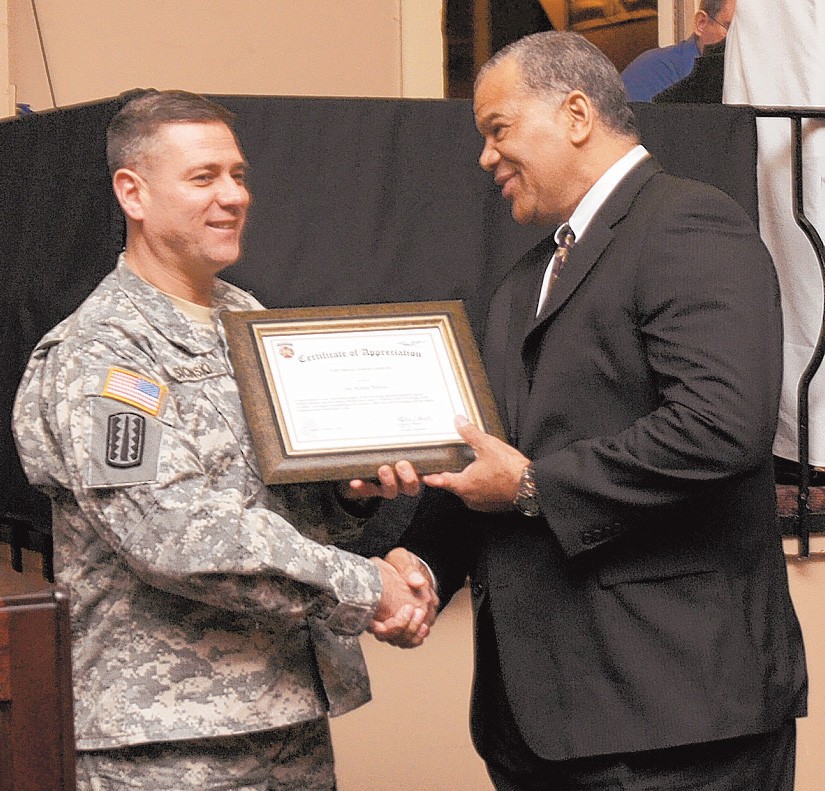
FORT BRAGG, N.C. - Examination must take place in all aspects of government to grow and respect human dignity, said Robert Wilson.
Wilson is the North Carolina assistant secretary of state and was the guest speaker Feb. 17 at Fort Bragg's luncheon. The observance, held at the Fort Bragg Officers Club, was themed "The History of Black Economic Empowerment," and sponsored by the Equal Employment Opportunity Special Emphasis Program Committee and the Fort Bragg Directorate of Human Resources.
Wilson spoke to a capacity crowd of nearly 500 people, who turned out to hear his message of the positive economic contributions of African Americans.
From George Washington Carver's development of applications of the peanut to Fred Jones' air conditioner and Charles Drew's blood bank, African Americans have long made economic contributions, Wilson said. Adding that to this day, the contributions continue.
Today, with 44 million weekly viewers of her talk show, "Oprah Winfrey is the most lucrative brand name in world," he said.
Winfrey has produced an economic force known as the Oprah Effect, Wilson said. This principal, according to a business Web site, proposes that the mere mention of a product on Winfrey's show sends sales skyrocketing.
Winfrey earns nearly $200 million yearly and is worth an estimated $2.7 billion, Wilson said. Black Entertainment Television founder Robert Johnson, former professional basketball player, Michael Jordan and golf professional Tiger Woods each have a high net worth and are economically empowered, Wilson said.
"All across the board, you have African Americans providing jobs, income and dollars into the economy," he said.
According to Wilson, yet another example of economic empowerment is the American Recovery and Reinvestment Act, signed by President Barack Obama in 2009. It is an economic stimulus package that increases spending to health care, energy, education and infrastructure.
African-Americans today have the second largest consumer buying power, estimated at $892 billion, said Wilson.
The observance was an opportunity to focus on the accomplishments of African Americans, said Willie McKoy, who works at the Special Operations Command.
"(It is) a celebration of how we've grown as a nation and a remembrance of how far we have to go to achieve the dream (of Martin Luther King, Jr.)," he said.
Retired Command Sgt. Maj. Charles Stevens listened as Wilson hailed some of the accomplishments of African Americans, but Stevens is accomplished in his own right. He served with the 555th Parachute Infantry Regiment, Triple Nickles, from 1946 to 1974. Triple Nickles were airborne smoke jumpers or fire suppressors.
Stevens said he is bothered about the need for an African American history month.
"If history had included us black folks, we would not have to have a black history month," he said.
But, Stevens seemed to enjoy the observance and said, "It was a time and a place to tell our story."
The observance of black history began as a week, when in 1926, historian Carter G. Woodson began the promotion of Negro History Week. February was chosen because it celebrated the birthdays of Abraham Lincoln, credited with freeing Negro slaves and of the abolitionist Frederick Douglass.
According to Woodson, before 1926, the history of black people had not been studied or
documented.
Negro History Week was expanded to Black History Month in 1976, the 50th anniversary of the beginning of Negro History Week and the bicentennial of the United States' independence, according to a history Web site.
Lieutenant General Frank Helmick, commander of the XVIII Airborne Corps, said that for African American Soldiers, dedication and commitment count more than the color of one's skin.
"We can never forget. We can never back peddle. We can't sidestep those accomplishments," Helmick said.

Social Sharing